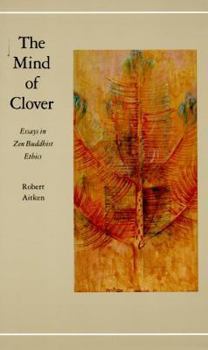The Mind of Clover: Essays in Zen Buddhist Ethics
Select Format
Select Condition 
Book Overview
In Taking the Path of Zen, Robert Aitken provided a concise guide to zazen (Zen meditation) and other aspects of the practice of Zen. In The Mind of Clover he addresses the world beyond the zazen cushions, illuminating issues of appropriate personal and social action through an exploration of the philosophical complexities of Zen ethics.
Format:Paperback
Language:English
ISBN:0865471584
ISBN13:9780865471580
Release Date:January 1984
Publisher:North Point Press
Length:224 Pages
Weight:0.68 lbs.
Dimensions:0.6" x 5.0" x 8.0"
Customer Reviews
5 ratings
THe Mind of Clover
Published by Thriftbooks.com User , 14 years ago
An amazing book. Totally covers the Precepts in an easy to understand fashion. The explainations given are concise and definative. I would thoroughly recommend this book for anybody interested in Buddhist ethics. Keith McGuckin
The very best exploration of the role of ethics in Zen for western students
Published by Thriftbooks.com User , 15 years ago
Robert Aitken Roshi is one of the true elder statesmen of Zen in the West. In this straightforward examination, Aitken demonstrates the vital role of ethical conduct that has always been (despite the opinions of many) a part of the Zen Buddhist path of practice and enlightenment. He walks students through an in-depth examination of the "Ten Grave Precepts" explaining the history, meaning, and various levels of understanding them for the true practice of Zen. He then outlines the deep, liberating message on the inherent nature of enlightenment, wisdom, and compassion that is the nature of the awakened mind in a series of essays. His essays, like all of Aitken Roshi's teachings, are layered with the wisdom of the enlightenend mind. This book is a true gift from one of the modern giants of Zen Buddhism.
"Maka Hannya Haramita Shingyo..."
Published by Thriftbooks.com User , 17 years ago
As a Zen practitioner preparing for Jukai I found Aitken-roshi's THE MIND OF CLOVER to be possibly the best book I have read to date on the Ten Grave Precepts. These Precepts (not to kill, lie, steal, self-aggrandize, defame others, misuse sex, misuse intoxicants, become wrongfully angered, to be generous, and to honor awareness, learning and community) are very similar to the Judeo-Christian Commandments in form. Aitken-roshi shows the reader however that the precepts are not simply ordinances imposed from outside but the very building blocks of personality and social interaction. He illustrates well how the precepts can and must be interpreted not blindly but with full cognizance of circumstance and consequence, both on a personal level and on a global level. THE MIND OF CLOVER takes what could be a very fuzzy and indeterminate subject and presents it with elegant simplicity. The book has been described quite correctly as a sonata, with each successive chapter building on the ones before it to reach a grand conclusion. One may disagree with certain of Aitken-roshi's personal observations---at times, his social politics seem reflexively trapped in 1960s amber---but there is no question that THE MIND OF CLOVER transmutes the practice of Zen from "simply sitting" in zazen to an active philosophy of life, allowing the adherent to take the calm, the awareness, and the wisdom found on the zafu and translate it into a way of daily living based on compassion and intimacy with all things. This book is excellently read in conjunction with Tenshin Reb Anderson's BEING UPRIGHT, a rather more remotely philosophical treatment of the Precepts on a less mundane, more spiritual level.
I read it often, to say the least
Published by Thriftbooks.com User , 17 years ago
It seems many people don't "connect" with this book. For myself, I find it more than inspiring. I have gone through many copies. I give it away regularly. I've lost one in a stream. Whenever I am feeling out of touch with my practice or my life, I read it. Or I read it when I'm feeling strong. Yes, I read it often. Aitken Roshi's teachings resonate deeply for me. Who knows why? This is the first book I read about Zen ethics and for me, it is the best. I find Aitken's writing to be clear, concise and beautiful. He was humble about areas in which he had doubt or un-knowing. I think is important to correct the mistaken notion that Zen is without an ethical base. Our culture has absorbed this idea with silly expressions like "that's so Zen" or mistaking Zen for nihilism (or vice versa). Please give this book a try.
Returning to the Natural State
Published by Thriftbooks.com User , 23 years ago
The author takes the Eightfold Path of Buddhism. It is discussed itme by item, in sufficient detail to show how the sense of self that goes with one's individual personality can be shed.The idea is to continue to act completely natural and to do all those things expected of a human being in one's particular status, position, etc. just as clover grows and behaves exactly as it should in its perticular sstatus and position.Clover has no mind or the functions associataed with the mind; the human being then acts just aa normally as the clover with the additional feature of a mind, but without any more cognitive identity of self than the clover.




